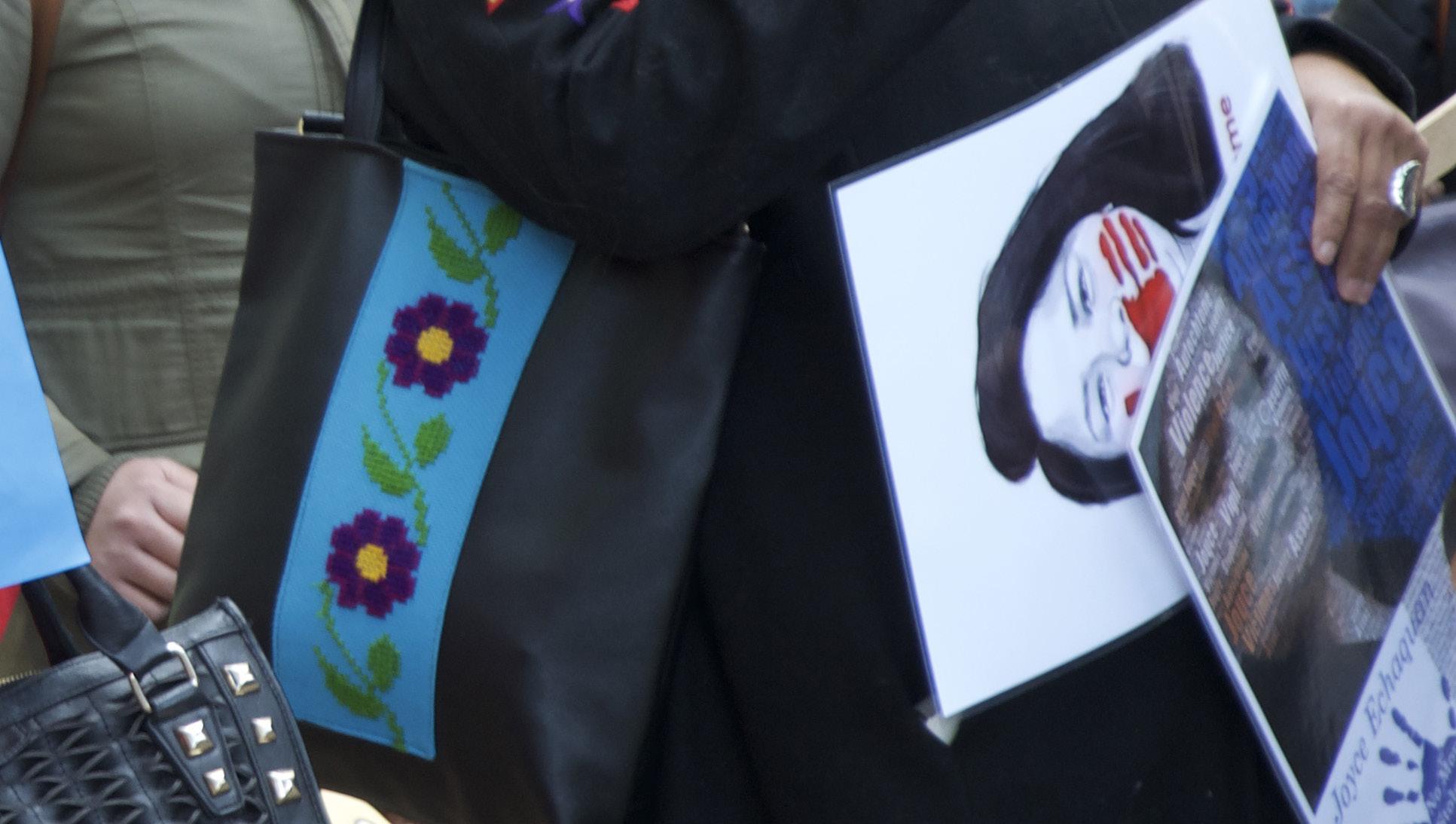
8 minute read
Joyce’s principle
Atikamekw document rejected by government aims to ensure equal access to health and social services
The tragic death of Joyce Echaquan does not tolerate institutional inertia when it comes to access, without discrimination, to health care and social services for Indigenous people. That’s the essential idea behind Joyce’s Principle, a document created by the Council of the Atikamekw Nation and the Atikamekw Council of Manawan, which was delivered to the federal and provincial governments on November 16.
Advertisement
The governing Coalition Avenir Québec, however, appears to have a higher tolerance for institutional inertia after it rejected an attempt by Liberal MNA Gregory Kelley to have the document adopted and implemented by the National Assembly November 24, objecting to the term “systemic racism” in the document.
Echaquan’s death on September 28 at a Joliette hospital was shocking even for those accustomed to the discrimination routinely faced by Indigenous people in public systems. After admitting herself to hospital with stomach pains, the 37-yearold Atikamekw mother of seven filmed hospital staff making racist insults at her shortly before she died.
“She fought until the end, wanting people to know what was going on with her,” said Atikamekw Grand Chief Constant Awashish. “[Joyce’s Principle] was initiated by leaders to come up with this document. We started with a few lines then asked the public for suggestions about what should be in the principle. A lot of people responded.”
Awashish told the Nation the idea is modelled on Jordan’s Principle, the child-first and needs-based commitment to ensure First Nations children receive equitable access to all government services. Joyce’s Principle similarly intends to guarantee Indigenous people have equitable access to health and social services without discrimination.
“It focuses on education and sensitization for government-Indigenous relations so that our rights are respected,” explained Awashish. “With Joyce’s Principle, we talk about the healthcare system, but we could say the same thing about all levels. People have distorted views of First Nations.”
The document begins with a statement by Echaquan’s husband, Carol Dubé, expressing his wish that her death didn’t occur in vain and that “no one ever again falls victim to systemic racism.” Acknowledging this last term is integral to the document, despite Premier François Legault’s refusal to admit it exists.
“All the people who communicated with us agree there is systemic racism, but still the government does not recognize it,” asserted Awashish. “It’s recognizing we were the ones colonized with a system put in place against us. That’s what we call systemic racism. That’s what Mr. Legault doesn’t understand.”
Awashish argued political rhetoric regularly paints Indigenous groups as
by Patrick Quinn
Joyce’s Principle

opposed to development and continues to perpetuate stereotypes that have grown over centuries. A solution highlighted in Joyce’s Principle calls for a massive re-education, particularly for healthcare workers.
It demands schools, professional orders and healthcare agencies offer training programs for cultural sensitization and that the Quebec government establish an ombudsperson’s office for Indigenous health and finance awareness campaigns to educate the general public about Indigenous issues. The document also specifically asks Legault to acknowledge systemic racism.
“That’s a form of discrimination talking that way when you’re the premier of the province,” Awashish insisted. “We have to change the whole mentality. Government has its part to do with training and awareness at all levels. We have to make the general population understand if we do well socially, everyone’s going to win.”
Joyce’s Principle demands that all Indigenous people have an equal right to the highest standard of physical and mental health, with a right to traditional medicines and the conservation of their vital medicinal plants, animals and minerals. It says the government must recognize Indigenous rights to autonomy and self-determination in matters of health and social services.
On November 6, Quebec announced $15 million to train healthcare workers in providing better and more culturally safe care for Indigenous people, while compensating liaison officers to accompany Indigenous people through the healthcare system. This cultural safety was a key recommendation of the Viens Commission report, released over a year ago.
“The $15 million is a good start but we’re going to keep working on the government to make sure it’s moving in the right direction,” Awashish stated. “Now what kind of curriculum is going to be taught to the non-Native staff? I regularly talk with [Indigenous Affairs] Minister Lafrenière and we want to work with him to improve the situation.”
Awashish said this funding is encouraging but he doubts it will be enough to overcome the huge gaps in Indigenous sensitivity at all levels of society. He’s also skeptical of the government’s committee on racism that includes no First Nations.
“We’ll wait a couple of months to see how the government is dealing with First Nations and where it’s trying to go,” explained Awashish. “There’s a lot of questions about how they see us and where they want to go. We’ll give them a chance. Hopefully they’re doing concrete action in good faith.”
With growing distrust of public services among Indigenous people, Awashish reported his community members are afraid to go to hospitals. Since the recent deaths of Echaquan and Atikamekw man Georges Herve Awashish, more people are wondering if racism played a role in the past deaths of family members in hospital.
“We have to keep talking about it, to keep the government on its toes on this matter,” said Awashish. “How many people talk bad about First Nations when we go into a hospital? There are a lot of questions our people are asking. We have to make sure the government ensures our people’s safety.”
Be there for yourself the way you’re there for others
You are always there when your loved ones are going through difficult times. But don’t forget about yourself—solutions exist to help you feel better.
The current situation may cause you distress. Experiencing various levels of anxiety in some spheres of life is normal. When this happens, you may find it more challenging to deal with your thoughts, emotions, behaviour and relationships with others. Most people succeed in adapting, but listening to your needs is vital. Don’t hesitate
to do whatever is necessary to help yourself.
Take care of yourself
• Rely on your personal strengths and have confidence in your abilities. • Remind yourself of the winning strategies you used in the past to overcome difficulties. There is no one-size-fits-all solution! Each and every one of us must take steps to foster our own well-being. • Enjoy life’s little pleasures, such as listening to music, taking a warm bath, reading, exercising, etc. • If you live close to nature, make the most of it. Breathe deeply and slowly as you walk. • Learn to delegate, and allow others to help you. • Ask for help when you feel overwhelmed. It is not a sign of
weakness, but rather a sign of strength when you are strong enough to do what is necessary to help yourself.
• Lend a hand in your community in a way that respects your personal limits and public health directives. By helping others, you can improve their wellness and your own as well. • Think about what has meaning and value for you. Reflect on the important things in your life that you can hold onto in hard times. • Reduce the stressors in your life. • While it is important to stay informed, limit the amount of time spent reading about COVID-19. Information overload can increase stress and anxiety, and even cause depression.
The Getting Better My Way digital tool
Getting Better My Way is a digital self-management tool for emotional health. If you are experiencing stress, anxiety or distress, this tool can help improve your well-being by identifying practical things you can do to feel better. Learn more at Québec.ca/Gettingbetter
Give voice to your feelings
• Keep in mind that having a range of emotions is normal. Feelings play an important role in life, and it is essential to experience them without passing judgment. • Use words to express what you are going through. Do you feel alone?
Are you worried? • Allow yourself to share your feelings with a trusted friend or family member. It might also be helpful to write down how you’re feeling or call a helpline. Find what works for you! • Those closest to you may not necessarily be able to “read” you.
Express your feelings. • Leave space in your life for your feelings and those of your loved ones.
Choose healthy living habits
• Try to keep to a routine for eating, resting, sleeping and other daily activities. • Take time to eat well. • Go to bed at an hour that lets you get enough sleep. • Be physically active on a regular basis, while complying with public health directives. • Reduce your consumption of stimulants like coffee, tea, soft drinks, energy beverages, chocolate, etc. • Drink lots of water. • Lower your alcohol, drug and tobacco consumption, or simply say no to them entirely. The same goes for gambling.
Make judicious use of social media
• Use critical thinking before sharing something on social media.
Ill-advised information can have harmful effects and be detrimental to everyone’s efforts in these times. • Use social media to share positive actions. • Watch videos that make you smile.
Help and resources
We are all going through unprecedented times that can intensify our emotional reactions. For example, you might feel greater fatigue or have fears that you can’t shake, or even have trouble just dealing with the day-today. Focus on these signs of a problem and, as soon as you can, contact resources that can help you to better manage your feelings and develop new coping strategies.
• Info-Social 811
Info-Social 811 is a free and confidential telephone consultation service available 24/7
• Regroupement des services d’intervention de crise du Québec
Provides 24/7 referral services for people in distress (French): centredecrise.ca/listecentres
• Suicide prevention crisis helpline
Crisis helpline that provides suicide prevention services 24/7: 1 866 APPELLE (277-3553)








